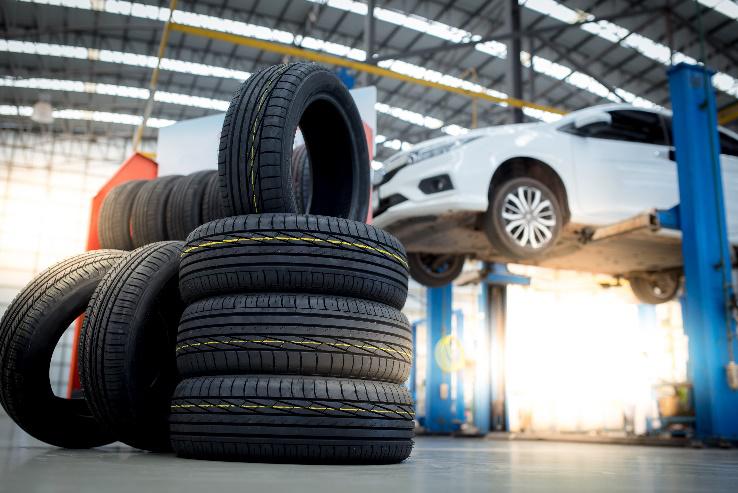August 14 2023
By: Shawn M. Galloway
What steps do you take to allow the capacity for your plans not to be ruined when an error occurs? And if you make an error, how do you show accountability?
My wife's vehicle was due for a service appointment, and, thanks to me inadvertently checking the structural integrity of a curb, it needed a new tire. An appointment was made for 10 am. At 2:30 pm, I received a call that the work was completed. Already knowing the service department closes at 7 pm and that I could get ahead of traffic, I paused what I was working on and departed for the dealership. As I turned in the loaner at Sewell Mercedes, my wife's vehicle was presented for pickup. Because of the safety risk of a gash in the sidewall of the right rear tire, the Russian proverb, "Доверяй, но проверяй" (doveryai, no proveryai - trust, but verify), prompted me to inspect the tire before accepting. Disappointingly, the tire had yet to be changed, despite the paperwork indicating it had been.
Bringing this to the attention of a nearby employee, I was asked to wait briefly for someone to ascertain what went wrong. As the service advisor assigned to my account had left for the day, the service manager promptly greeted me, apologized for the delay, and inquired how I preferred the issue to be corrected. Another loaner, or wait? Choosing the latter, I caught up on some pressing items in the waiting area.  The manager eventually explained what happened.
The manager eventually explained what happened.
The right rear tire was approved for replacement (tire warranty package); however, in addition to the other items, oil change, etc., the service ticket indicated the need to replace the left rear tire. Inquiring with the technician, who thought the request was odd as the tire was almost new, without checking into it further, he performed the replacement on the left rear tire. The service manager rapidly corrected the issue, and I was on my way with a full tank of fuel, an unexpected gesture at the dealership's expense. The next morning, I received a call from my service advisor, profusely apologizing, also taking the time to thank me for my business and ensuring I was still satisfied with how it was handled. I was. Here are the takeaways:
Build capacity for errors. I paused what I was working on and left when the vehicle was ready, rather than waiting longer in the day or near closing time, allowing for the extra unexpected service time. Having access to some work on my phone, I could remain productive.
Behave congruent with company values. The eighteen dealerships of Sewell across Texas are dedicated to "building relationships, not selling cars and trucks." "Customers for life" is their aim. The behavior of the service manager and, later, the advisor, reinforced the values that are important to the company brand.
Be accountable and responsible for your own performance. The service advisor took full responsibility by describing his error, offering a sincere apology, and following up to ensure the resolution was acceptable.
With employees and customers, mistakes are made daily (hopefully small ones), and not everything will always go as planned. How confident are you of the efficacy of your systems to prevent deviations and recover from them when they occur? Does your culture have the capacity to ensure behaviors are aligned with values and expectations? Is your climate one that encourages psychological safety, allowing employees and leaders to embrace mistakes, take responsibility for them, and work to correct them? Systems and culture. Both are vital to excellence in any area of operations.
"Things don't always go as planned, but it's when you make a plan out of the unplanned and make the best of the unlikely things in life." — Auliq Ice
"Mistakes are a fact of life. It is the response to error that counts." — Nikki Giovanni
"Psychological safety is not about being nice or lowering performance standards, it's about giving candid feedback, openly admitting mistakes, and learning from them." — Amy C. Edmondson

Shawn Galloway, CEO of ProAct Safety, is an expert in safety excellence. With almost thirty years of experience, he is a highly sought-after advisor, keynote speaker, and expert witness. Shawn has become a trusted partner to leading organizations across various industries worldwide. He ranks in the top 1% of the most prolific writers in his field, having authored over 500 articles and several bestselling books. He also launched the world's first safety podcast, Safety Culture Excellence©. As a recognized authority in safety, Shawn has received awards such as being named among the Top 50 People Who Most Influence EHS and a Top 10 Speaker, among others.
He is a regular guest on Bloomberg, Fox News, The Daily Mail, Dubai One, U.S. News & World Report, Sirius Business Radio, Wharton Business Daily, and leading safety magazines and podcasts. Shawn also serves as a member of the Harvard Business Review Advisory Council, Forbes Business Council, and Fast Company Executive Board, enabling his influence to shape safety thinking and strategy at the executive level.
